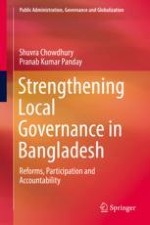2018 | OriginalPaper | Buchkapitel
3. Past Reforms on People’s Participation and Accountability at the Local Level in Bangladesh
verfasst von : Shuvra Chowdhury, Pranab Kumar Panday
Erschienen in: Strengthening Local Governance in Bangladesh
Aktivieren Sie unsere intelligente Suche, um passende Fachinhalte oder Patente zu finden.
Wählen Sie Textabschnitte aus um mit Künstlicher Intelligenz passenden Patente zu finden. powered by
Markieren Sie Textabschnitte, um KI-gestützt weitere passende Inhalte zu finden. powered by
